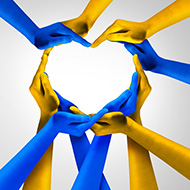
What support is available for vets seeking refuge in the UK?
As the devastating situation in Ukraine continues to unfold, individuals and organisations from across the profession have been launching initiatives to support Ukrainian vets seeking to rebuild their lives in the UK.
From the RCVS Financial Support Scheme to an online portal providing the most up-to-date information and advice, below is a summary of the schemes helping to bring Ukrainian veterinary professionals and their families to safety.
RCVS financial support scheme
The RCVS financial support scheme for refugees is immediately available for Ukrainian vet professionals and all other nationalities with refugee status but holding qualifications not recognised in the UK. The scheme is run in collaboration with the Refugee Council and several leading UK veterinary organisations. As detailed on the RCVS website, the scheme:
- enables UK-based vets with refugee status to take the RCVS Statutory Examination for Membership for free
- provides financial support for travel and accommodation to help them attend examinations
- includes free access to the RCVS Knowledge library resources
- includes free membership to the British Small Animal Veterinary Association (BSAVA), British Veterinary Association (BVA), British Equine Veterinary Association (BEVA), British Cattle Veterinary Association (BCVA) and Veterinary Management Group (VMG).
RCVS president Kate Richards said: “We are determined to offer as much help and support as we can to our Ukrainian veterinary colleagues fleeing this crisis and seeking refuge in the UK." Veterinary professionals seeking refuge in the UK are encouraged to contact Jude Bradbury, examinations manager, via j.bradbury@rcvs.org.uk or +44 (0)20 70 50 50 43.
Free BVA membership
The British Veterinary Association (BVA) is currently offering free membership to any Ukrainian veterinary surgeon seeking to come to the UK.
Malcolm Morley, BVA junior vice president, said: “Like everyone, we are deeply concerned and saddened by the ongoing crisis unfolding in Ukraine. We will monitor the situation closely over the coming weeks and would advise any members who wish to support the humanitarian response to make a donation to charity appeals such as the ones being run by British Red Cross, Save the Children and UNICEF.”
The British Veterinary Association (BVA) has also launched a survey to help 'match' members of the UK veterinary community with Ukrainian veterinary professionals.
Designed to support the government’s Homes for Ukraine scheme, details gathered by the survey will be used to ‘match’ participants with Ukrainian vets who contact the BVA looking for somewhere to stay. You can read more about the scheme here.
Vets for Ukraine
The FVE, along with FECAVA and the World Veterinary Association, has launched an online portal to coordinate aid by European vets to help Ukrainian vets, their families and animals. Entitled Vets for Ukraine, the portal contains information on the recognition of veterinary degrees in EU countries and contact details of vets hosting vets and their families, both in the UK and worldwide. The portal also contains information on supporting veterinary students and individuals who may be fleeing with their pets.
Get in touch
We’re looking to hear from anyone who has applied to the Homes For Ukraine scheme for a series on MRCVSOnline and VNOnline. What has been your experience of the process so far, and what advice would you give to anybody looking to host refugees in the UK? Please email editor@mrcvs.co.uk
Find out more:
Support for Ukraine: Taking action - How to help when you don't have a spare room.
Support for Ukraine: Making connections - How to find a Ukrainian individual or family to sponsor.



 The latest
The latest